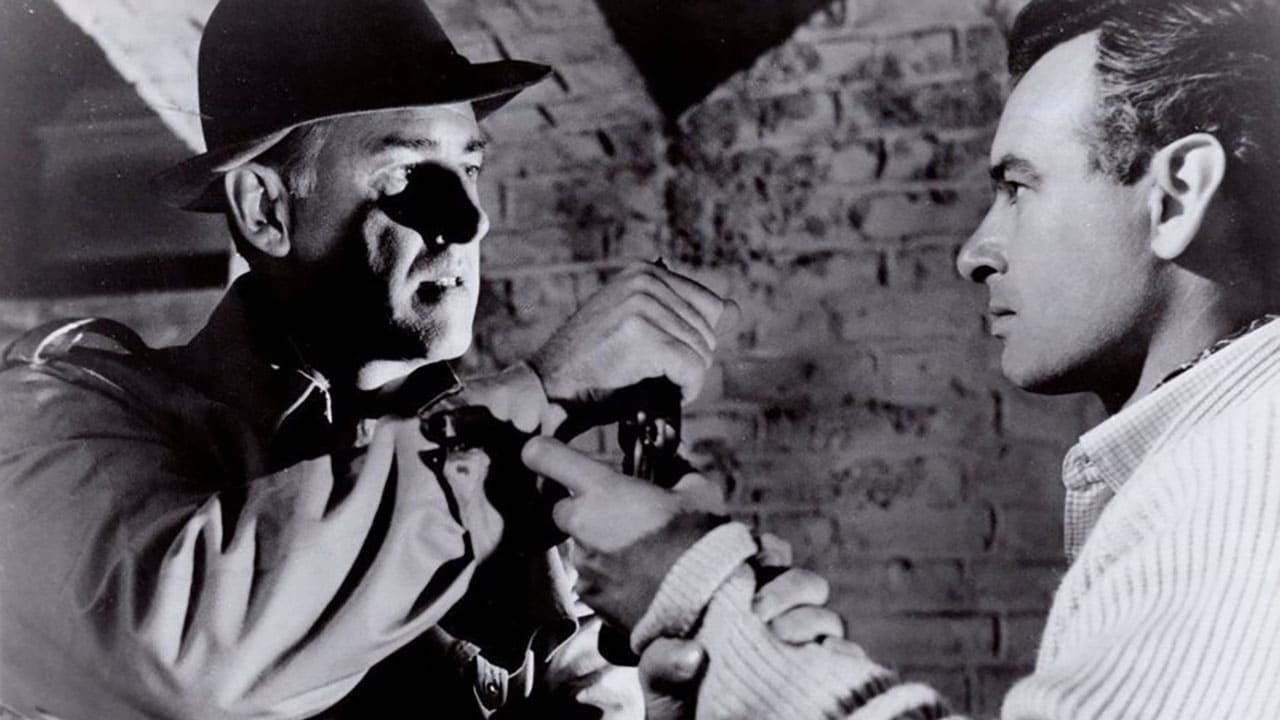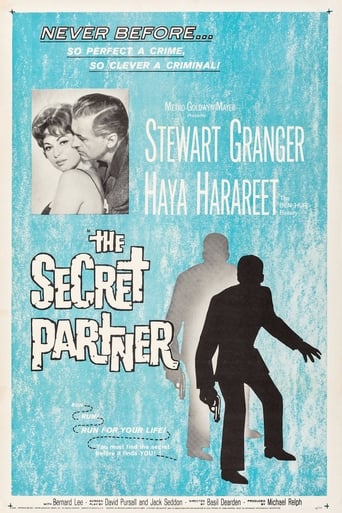

THE SECRET PARTNER, is a quite good suspense thriller. We are taken down a path of intrigue, and a man's search for the truth. Or maybe not. Stewart Granger is very good, in a quiet performance that runs him from pillar to post. We see him being blackmailed by a dentist of all people, who knows that Granger was an s thief before this job. . The dentist is approached by a man in a mask and told there might be a way to drug Granger to get the combination to the safe. He goes through with the plot, and the money goes into the hands of the masked man. Granger runs all over the place to find that man and clear his name. But then something just does not seem right. The plot is off somewhat, and when it is finally revealed we see that Granger is the masked man, and had planned the whole thing to rob his business. The wife was in on the whole thing. He does it all for her love, but is mistaken that she never wanted money, just his love. And he could have kept her if only he had not used her over and over in his plots. So as we see here, money can't buy love, as she leaves him for another man, and he returns the money, because now it has no value without her. The end is similar to the end of the LIGHT TOUCH, where the art thief returns the stolen religious painting to the church so he can have the love of the girl. Granger is much better here, than in that film. A very good thriller.
... View MoreThere's nothing particularly offensive about this later effort in Stewart Granger's career. Basil Dearden directs with mature competence, Bernard Miles provides his usual solid support, and the plot carries a viewer along without having to drag him by the heels. If Haya Harareet is no more than a blandly attractive figure as Granger's wife, well, so what? Granger is a well-off businessman who has one of those shameful secrets in his past that make blackmail profitable. The extortionist is Granger's dentist. I never did like dentists anyway. They're always smiling and saying things like, "Turn this way a little," and then they hurt you even though you've never done them any harm. To top it off, you have to pay them.Anyway, this weedy little surgeon is visited one night by a mysterious masked man who instructs him at gun point to knock Granger out with gas, inject him with a fast-acting barbiturate, and squeeze out of him the combination to the office safe, meanwhile making impressions of the office keys. The whining little creep complies with a combination of fear and greed.Evidently the masked man has set up a frame because as the Superintendent, Bernard Miles, investigates the crime the evidence begins to pile up against Granger himself. Granger escapes the grasp of the police and most of the film is taken up with his pursuit of the mysterious man in the mask.There's a twist at the end. The prognosis is problematic but it seems that just desserts will be served, followed, one hopes, by a postprandial snort of nitrous oxide.Granger had a long career beginning in Britain in a few classy productions before moving to MGM around 1950 to become a kind of latter-day Errol Flynn. He was handsome enough. His voice was a resonant baritone. And he looked good in period wardrobe. But he was more than dismissive of his own career, downright bitter at times. The curious thing is that, as he aged, he STILL looked good in a stereotypical way. He went gray at the temples and seemed never less than vigorous, sometimes distinguished, but the trajectory of his fame followed a familiar downward arc. But if he'd never made a movie other than, say, "Scaramouche" or one or two others, he'd be worth at least a footnote.I can't say too much for this particular movie. It's strictly routine. It's the sort of thing that Hollywood was grinding out as B features during the 1930s -- mysterious masked man prompts scared dentist into crime and frames hero. Should someone throw open a door and find a ransacked apartment, the musical score goes, "Ta-DAHHH!" All familiar stuff. But, as I say, it's in no way offensive. It's just that there's nothing very original about any of its properties. With a little tweaking it could have been an inexpensive Charlie Chan mystery.
... View MoreThe plot creaks along slightly but worth seeing for the views of London docks as they were. The Bernard Lee character is also memorable for the number of cigarettes he smokes. In every scene he's in, he's either smoking, lighting up or lighting another cigarette from his previous one. Obviously a 60-a-day man. Older viewers will recall Conrad Phillips at the star of the long-running William Tell TV series in which he battled Willoughby Goddard who appears in the movie as the seedy hotel keeper. Stalwart British character actors Norman Bird, Hugh Burden and Lee Montague also shine, while Melissa Stibling was the wife of the film's director Basil Dearden
... View MoreVery few crime films end on a tragic note, especially if the plot does not involve deaths and maiming. This is one such example. The last shot of the film--a long shot--of the protagonist walking alone arouses the viewers pity.The film seems to infer that the bad guys remain bad and end up losers. Today such stories would seem sociologically incorrect to film. The plot of the film is rather good and would provide the viewer with his/her money's worth.The last half hour of the film not only entertains but is quaintly philosophical. Haya Harareet's ("Ben Hur"'s Esther) character is a fascinating study of love for her husband and what she decides to do is even more poignant and elegant. Stewart Granger and Bernard Lee (M of the early James Bond films) perform well, but the ultimate heroes are the story writers (David Pursall and Jack Seddon) and the director Basil Deardon who make the film fairly above-average entertainment.
... View More